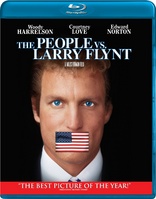The People vs. Larry Flynt Blu-ray Movie
HomeThe People vs. Larry Flynt Blu-ray Movie 
Image Entertainment | 1996 | 129 min | Rated R | Apr 05, 2011Movie rating
7.3 | / 10 |
Blu-ray rating
| Users | 4.0 | |
| Reviewer | 4.0 | |
| Overall | 4.0 |
Overview
The People vs. Larry Flynt (1996)
At the twilight of the sexual revolution in the U.S., a sex industry entrepreneur named Larry Flynt leveraged a small string of Ohio strip-clubs into the beginnings of a publishing empire. "Hustler" magazine's publisher, a grade-school dropout and Kentucky redneck, was nobody's hero, but circumstance would cast him as the era's last crusader. It was a role that brought Larry Flynt both ruin and glory. Flynt becomes the unlikely champion of the First Amendment when he takes his fight against the Rev. Jerry Falwell all the way to the Supreme Court.
Starring: Woody Harrelson, Courtney Love, Edward Norton, Brett Harrelson, Donna HanoverDirector: Milos Forman
| Biography | Uncertain |
| Drama | Uncertain |
| History | Uncertain |
Specifications
Video
Video codec: MPEG-4 AVC
Video resolution: 1080p
Aspect ratio: 2.40:1
Original aspect ratio: 2.39:1
Audio
English: DTS-HD Master Audio 5.1 (48kHz, 24-bit)
Subtitles
English SDH, Spanish
Discs
25GB Blu-ray Disc
Single disc (1 BD)
Playback
Region A (locked)
Review
Rating summary
| Movie | 5.0 | |
| Video | 4.0 | |
| Audio | 4.0 | |
| Extras | 4.0 | |
| Overall | 4.0 |
The People vs. Larry Flynt Blu-ray Movie Review
The Godfather of Trash Talk
Reviewed by Michael Reuben June 25, 2011If a writer made up Hustler publisher Larry Flynt, no one would believe the story, which is why it
makes a great movie. The most outlandish events in the film actually happened, while the
condensations and composite characters that are essential when a long life gets reshuffled into a
two-hour film are almost entirely logistical (such as one magazine editor taking the place of
many). The film was skillfully crafted under the direction of two-time Oscar winner Miloš
Forman, who was tempted out of retirement by the juicy screenplay by Ed Wood writers Scott
Alexander and Larry Karaszweski; the performances are complex and authentic, resulting in
multiple award nominations (and more than a few wins); and the reviews were ecstatic.
So why didn't the film do better? And why does it seem to have faded from people's memory?
Like Flynt's life, the movie's path took odd turns. Its creators expected to be attacked by the
same conservative forces that opposed Flynt in the Seventies and Eighties, but by 1996 those
forces had bigger fish to fry in Washington - and the landmark 1988 Supreme Court decision
that Flynt won was not only sound constitutional law, but it also supported everyone's right to
hack away at public figures with impunity. No, the attacks on People vs. Larry came from the
opposite direction: from feminists who had long denounced Hustler's treatment of women as sex
objects and pornography's use of women generally. For these critics, Flynt's First Amendment
victories were far outweighed by the fact that his entire media empire was founded on the
the exploitation of half of humanity. They were willing to accept reasonable limits on speech as a
response to what they perceived as a clear and present danger to the victims of Flynt and the male
audience to which he pandered.
But there's a problem with People vs. Larry for anyone with an agenda, and it's this: The film is
hugely entertaining. It's a classically structured bio-pic of a complex man you'd never want to
work for, but who's a riot to watch. And by getting you to keep watching Flynt (brilliantly
embodied by Woody Harrelson, poised on a knife edge between vicious and charming, canny and
crazy), the movie humanizes someone that his opponents would prefer to have us see as the devil
incarnate. Making the target of a militant opposition seem human, even though hugely flawed, is
one of the most effective counterattacks. Maybe that's why feminist groups mounted an intense
campaign in 1996 to discourage viewers from seeing the film, after it was a hit in limited release.
A human Larry Flynt was the last thing they wanted. The box office stalled at $20 million, and
the film, budgeted at $36 million, was a financial disappointment.
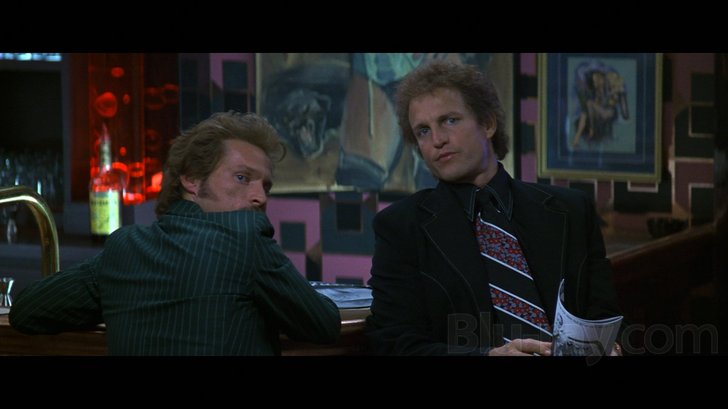
The Brothers Flynt
The film shows Flynt's dirt-poor beginnings in rural Kentucky as a kid selling moonshine with his younger brother, Jimmy. Then it jumps forward to 1972 when the brothers (Harrelson and his real-life brother, Brett) are running a string of strip joints in southern Ohio called the Hustler Go-Go Clubs. They aren't making any money, but they enjoy sleeping with the women they employ, and Harrelson doesn't hold back from portraying Flynt as a scumbag with a twinkle in his eye.
One day a new dancer named Althea Leasure appears, and Flynt's world changes. Althea is played by Courtney Love, a personality who evokes reactions as complex and sometimes as negative as Larry Flynt. But Love's performance as Althea won her a shelf of critics' awards and is unlike anything I've ever seen. The studio fought ferociously against her getting the part, and ultimately it took a combination of director Forman and producer Oliver Stone - four Oscars between them, as the screenwriters note in their commentary - standing in the office of the studio head and demanding that she be hired. Even then, Forman, Harrelson and the producers had to agree to pay her steep insurance costs personally.
As portrayed by Love, Althea is Larry's equal in wackiness and depravity and by far his superior in emotional intensity. All of their scenes together crackle with a kind of fierce uncertainty, because there's a sense that anything can happen. (In his commentary, Harrelson describes with admiration how Love could be different on every take, even without changing the dialogue.) As it happens, when he meets Althea, Flynt has just had the idea to create a "newsletter" to publicize his clubs. The newsletter becomes Hustler magazine, which Flynt envisions as a blue collar answer to Playboy. Sales go nowhere until, one day, an Italian freelance photographer calls offering nude photos of Jacqueline Onassis. With that, Flynt discovers the combination that will make Hustler a success: porn plus tabloid journalism.
With success came legal trouble, and the second act of the film is devoted to Flynt's long battles with blue noses. One of his chief adversaries in Cincinnati is Charles Keating (James Cromwell), a pious prig who would later become the face of the savings and loan scandal of the Eighties. After his first arrest, Flynt meets Alan Isaacman (Edward Norton), the lawyer who will eventually argue his landmark Supreme Court case. Isaacman is a real person who has represented Flynt for years, but in the film he stands in for the small army of lawyers representing Flynt and Hustler in states across the union. It was while leaving one of these legal proceedings in Lawrenceville, Georgia, that Flynt was shot by a sniper who has never been apprehended. Flynt has been paralyzed from the waist down and confined to a wheelchair ever since.
At the time of the shooting, Flynt was, improbable as it may seem, a born-again Christian, having been converted by Ruth Carter Stapleton, the sister of President Jimmy Carter. In the film she is played with just the right touch of celebrity flair by Donna Hanover, then-wife of then-New York Mayor Rudy Guiliani. The shooting undid Flynt's religious conversion, and he disappeared with Althea into a five-year haze of painkillers. When he emerged, freed from pain by a surgical procedure, Flynt kicked the drug habit and embarked on a new phase of his career: professional provocateur.
Hustler had made Flynt wealthy, and he began using his money to cause trouble. Among his most notorious stunts was leaking the tape of car manufacturer John DeLorean buying cocaine from the FBI to CBS News. His outbursts during court proceedings over the tape landed Flynt in a psychiatric facility. While there, he was sued for libel and emotional distress by the Rev. Jerry Falwell over an ad parody portraying Falwell losing his virginity to his mother. A split jury verdict resulted in a Supreme Court appeal, which is the film's finale. Taken directly from the transcripts, performed by Norton with the controlled passion that the real Alan Isaacman must have felt when he stood before the Court, the sequence is a sophisticated primer on First Amendment law. It could legitimately be used in a high school civics class.
Still, the heart of the film remains the relationship between Larry and Althea Flynt, and that story ended tragically. Althea didn't live to see her husband's Supreme Court vindication. She had died of AIDS-related causes the year before.
The People vs. Larry Flynt Blu-ray Movie, Video Quality 

At this stage of Blu-ray's life, there's no excuse for cramming a 130-minute film onto a BD-25.
If Sony had kept People vs. Larry, it would have used a BD-50, but smaller publishers like Image
are willing to risk video quality to save a buck. In this case, Image seems to have gotten away
with it. I watched the disc looking for signs of compression artifacts, but didn't see any.
However, my screen is 72", and it's possible that projection at a larger size will reveal defects I
didn't see.
The 1080p AVC-encoded image appeared detailed and film-like. The film's clever production
and costume design use the awfulness of Seventies fashion and decor to accentuate the
humbleness of Flynt's beginnings and the unabashed crassness with which he challenged
Playboy's hegemony among skin mags. As Flynt became more successful, his taste didn't
improve, but he had more to spend, and the sets become bigger and grander accordingly. The
Blu-ray allows one to appreciate, to an extent that hasn't been possible since the film was in
theaters, Patrizia von Brandenstein's production design, Arianne Phillips numerous costumes and
the convincing make-up that ages the various characters (the team was led by Ben Nye). The fine
detail in many of the hideous checked and striped polyester patterns is one of many indications of
the image's quality.
Black levels are generally good, as is shadow detail, although there are very few scenes in low
light, and this may be one reason why Image was able to get away with a BD-25. Flynt liked his
world bright and colorful, and to maintain a consistent palette through the film, cinematographer
Phillipe Rousselot managed to find ways to make even courtroom scenes appear other than dully
monochromatic.
The People vs. Larry Flynt Blu-ray Movie, Audio Quality 
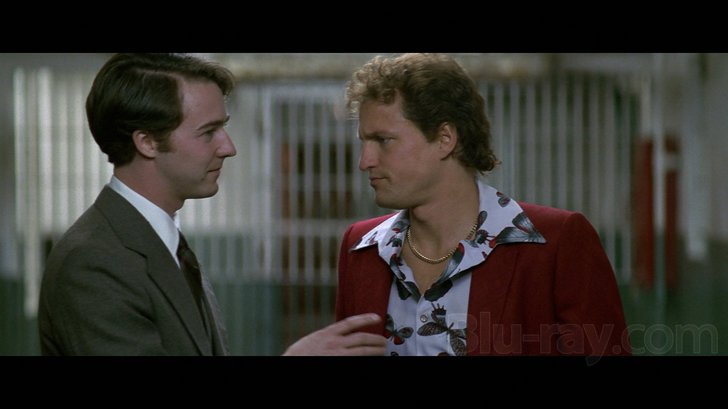
Though made in the era of discrete multi-channel surround, People vs. Larry does not have an active sound mix. Indeed, the film's sound design is almost old-fashioned in its focus on dialogue and its confinement of sound effects to the front soundstage. Even the sequence at the big Fourth of July party Larry throws at his Ohio mansion is sonically restrained, despite multiple opportunities to feature the sounds of fireworks, crowded rooms and a mini-orgy in a jacuzzi. The rare moments when the entire soundfield comes alive are musical, to emphasize (or, in some instances, take over entirely) a key emotional moment. The music may be a classical selection, a piece of underscoring by Thomas Newman, or a period-appropriate selection like Gary Wright's "Dream Weaver". There is nothing to fault in the DTS lossless track.
The People vs. Larry Flynt Blu-ray Movie, Special Features and Extras 
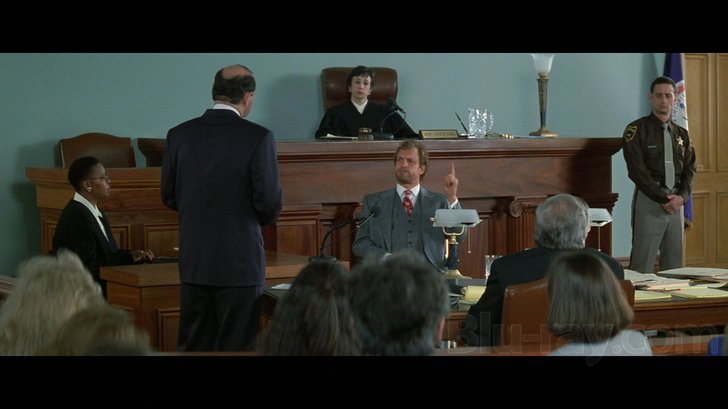
The features have been ported over from the special edition DVD released by Sony in 2003. However, not everything has been included, even though Image re-released the Sony special edition with the entire array of features in December 2010. Omitted from the Blu-ray are two featurettes entitled "Free Speech or Porn?" and "Larry Flynt Exposed". Maybe if Image had used a BD-50, they would have had room.
- Commentary with Screenwriters Scott Alexander and Larry Karaszweski: The two writers
are engaging, energetic and informative throughout the track. They provide a wealth of
information about their own background, the genesis of the project, their search for a director,
casting, various versions of the script, Forman's specific input, their interactions with Columbia
Studios executives (where they never expected to be making the film), and the film's reception.
The writers' discussion of the points at which they departed from strict biographical accuracy, and the reasons for doing so, is especially educational. As Alexander and Karaszweski explain, their goal is to persuade studios to make movies they might not otherwise make by fitting their stories into a traditional "three act" script structure. "Our content is strange, but our form is fairly safe", they say, describing their film as an anti-Great Man film, and comparing the moment when Flynt realizes that he can distinguish Hustler from Playboy by showing female genitals to "Don Ameche inventing the telephone". They also review the extensive research they were able to do without any official approval or access to Flynt, because, once word of the project leaked out, dozens of "squirrely" former employees came forward who were willing to dish about their eccentric boss. A friend who worked at a magazine acquired by Flynt Publications snuck into the archives and snuck out a copy of every issue of Hustler ever published. Only at the end, when a license was needed to use the various logos, was Flynt approached directly. He had no say over the final content, because, as the writers immediately pointed out to the studio, the very Supreme Court precedent he'd won allowed them to say whatever they wished about him. - Commentary with Actors Woody Harrelson, Courtney Love and Edward Norton: The three actors were recorded separately, and portions cut together. For whatever reason, the allocation of time is wildly unbalanced. Love has at least twice as much time as Harrelson, while Norton is barely allotted any time at all; in the first hour of the film, he makes two brief comments. Maybe Love got more time because she spoke so freely. "I'm not talking about acting at all, I'm just gossiping!" she exclaims at one point, and gossip she does, talking freely about the relationship she started with co-star Norton during production and noting at one point that he will probably hate her commentary. But along the way, Love drops revealing observations about how Forman directed her and, maybe without realizing it, provides a sense of why Forman fought so hard to cast her as Althea.
- Deleted Scenes (SD; 2.35:1, non-enhanced; 2:21). There are two scenes. The first, with optional commentary by Harrelson, is from the removed sequence depicting Flynt's mock (or was it?) bid for the Presidency. The second, with optional commentary by Karaszweski, has Flynt showing his parents an exact replica of their Kentucky cabin that he built in the basement of his Ohio mansion so that he'd always remember where he came from. The writers discuss the scene in their commentary, where they vouch for its authenticity.
- Theatrical Trailer (SD; 1.66:1, non-enhanced; 2:23). This was a lively and effective trailer that ended with the insightful exchange between Isaacman and Flynt, where Flynt cannily tells Isaacman why the attorney won't quit: "I'm your dream client. I'm the most fun, I'm rich, and I'm always in trouble." He was right.
The People vs. Larry Flynt Blu-ray Movie, Overall Score and Recommendation 
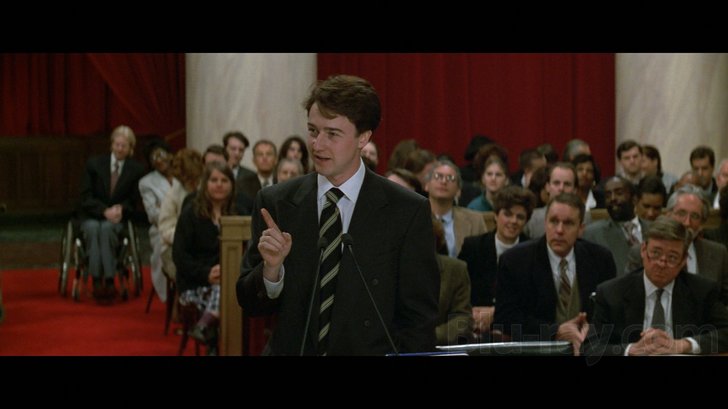
To its credit, People vs. Larry didn't sanitize Flynt or make him an artificial hero. If the film has
a weakness, it's that American society has moved on, and the issues that made Flynt a scandalous
figure are almost quaint by today's standards. Volumes of material far more lurid than anything
Hustler ever published are just a few clicks away on the internet, and rhetoric such as Hustler
directed at Falwell has become common parlance in the blogosphere, safely shielded by the
Supreme Court decision of which Flynt is so proud. Even judges aren't immune. When a Supreme Court justice retired recently -- one who joined the Supreme Court after it decided Hustler v. Falwell -- one critical commentator
wrote: "The nation loses the only goat fucking child molester to ever serve on the Supreme Court
in David Souter's retirement." The comment could have been vintage Flynt, but in today's world the commentator was hired by CNN instead of getting sued.
That's the First Amendment for you. It cuts in all directions. If you want to understand how we got here, see The People
vs. Larry Flynt. The movie is recommended, and so is the Blu-ray.
Similar titles
Similar titles you might also like

On the Basis of Sex
2018

Dark Waters
2019

Denial
2016

Dallas Buyers Club
2013

Marshall
2017

Welcome to Marwen
2018

Loving
2016

American Crime Story: The People v. O.J. Simpson
2016

Behind the Candelabra
2013

The Mauritanian
2021

Molly's Game
2017

Conviction
2010

House of Gucci 4K
2021

LBJ
2016

Cesar Chavez
2014

Mandela: Long Walk to Freedom
2013

The Bang Bang Club
2010

Killing Lincoln
2013

Wild
2014

Bombshell
2019
